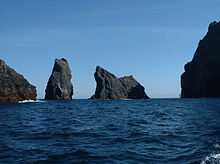Stac Biorach

| Location | |
|---|---|
 Stac Biorach Stac Biorach shown within the Outer Hebrides | |
| OS grid reference | NA071013 |
| Names | |
| Gaelic name | Stac Biorach |
| Meaning of name | "pointed stack" |
| Physical geography | |
| Island group | St Kilda |
| Highest elevation | 73 m (240 ft) |
| Political geography | |
| Sovereign state | United Kingdom |
| Country | Scotland |
| Council area | Outer Hebrides |
| Demographics | |
| Population | 0 |
| References | [1][2][3] |

Stac Biorach (Scottish Gaelic: "the pointed stack") is a sea stack, 73 metres tall, situated between Hirta and Soay (in the "Sound of Soay") in the St Kilda archipelago of Scotland. It lies west of Stac Shoaigh (Soay Stac) (61 metres).[3]
Coordinates: 57°49′44″N 8°37′18″W / 57.82889°N 8.62167°W
History
The stack has never been permanently inhabited, but has contributed considerably to the local economy by supplying the St Kildans with sea birds and their eggs. Rev. Neil MacKenzie, a Church of Scotland minister who resided on St Kilda from 1830 to 1844, observed the islanders collecting eggs from here in baskets like flat-bottomed bee hives, each basket holding about 400 eggs.
Like the other islands in the St Kilda archipelago, Stac Biorach is extraordinarily rich in birdlife, and boasts the highest colony of guillemots in the archipelago.[4]
Recreational climbing on the stack seems to have started in the early 1880s. It appears that the first non-St Kildan to climb the stack was Charles Barrington, the first man to climb the Eiger; he ascended Stac Biorach in 1890,[5][6][7] calling it the most dangerous climb he ever undertook.[8] Today climbing in all of the St Kilda archipelago is subject to the permission of the National Trust for Scotland[9] (which rarely, if ever, grants it), The stack is quite difficult to climb, "one which only a few of the natives could lead."[10][11]
See also
References
- ↑ 2001 UK Census per List of islands of Scotland
- ↑ Haswell-Smith, Hamish (2004). The Scottish Islands. Edinburgh: Canongate. ISBN 978-1-84195-454-7.
- ↑ 3.0 3.1 Ordnance Survey
- ↑ Maclean, Charles (1992). St. Kilda: Island on the Edge of the World. Canongate Press. p. 99. ISBN 978-0-86241-388-0.
- ↑ Barrington, R.M. "The Ascent of Stack na Biorach". Alpine Journal 27: 195.
- ↑ "St Kilda Management Plan Review". The Scottish Mountaineer. Mountaineering Council of Scotland. 2002. Retrieved 2009-02-05.
- ↑ The following account seems less reliable: Mellor, Chris (2002). Stack Rock: An Illustrated Guide to Sea Stack Climbing in the UK and Ireland (PDF).
- ↑ Heathcote, Norman (1900/1901). "Climbing in St Kilda". Scottish Mountaineering Club Journal (Scottish Mountaineering Club) 6: 146–151. Retrieved 2009-02-08. Check date values in:
|date=(help) p. 148. - ↑ St Kilda Management Plan 2003-2008 (PDF). National Trust for Scotland. 2003. p. 103.
- ↑ Steven, Campbell Rodger (1975). The Story of Scotland's Hills. R. Hale. p. 39. ISBN 978-0-7091-4975-0.
- ↑ According to one source, the stack was climbed by an "outsider," R.M. Barrington, only once, in 1929. Maclean, St. Kilda: Island on the Edge of the World, 103.
| ||||||||||||||||||